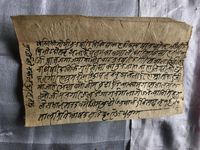A copy of a purjī from the office for salt transactions in Gorkha ordering the confiscation of salt (1951 VS)
ID: Tsum_0001_0024
Edited and
translated by Nadine Plachta and Rajendra Shakya
Created: 2018-02-19;
Last modified: 2020-08-05
For the metadata of the document, click here
The accompanying edition, translation/synopsis and/or commentary are available under the terms of the Creative Commons Attribution-ShareAlike 4.0 International License
Abstract
The purjī of which this is a copy was issued by the kacahari in Gorkha to officers stationed in the region that spans from Khānacoka Bhañjyāng to Lārkep on the border with Bhoṭa. It orders them to confiscate all the salt purchased in Tibet and sold on the local market in cases where such trade violates savālas and istihāras. The document orders local authorities to hand over all such salt traded to persons posted at the kacahari.Diplomatic edition
[1r]
1श्री\1पुर्जिकोनकलदुरुस्तछ1स्वस्तिश्रीगोर्षानुनषरिदविक्रिय़कहडीकस्यषानचोक्भंञ्ज्यांदे2षिभोटदोसन्धलार्केप्समकाअमालीथरिमुषिय़ाहरुकेपु
3र्जिप्रान्तजगाजगामाभोटवाटनुनषरिदगरीसव़ालईस्तीहा
4नघिषरिदविक्रिगरिलीय़ाकानुनजाहाजाहालिय़ाकाछज
5फत्गरिहाम्रमनीस्डिडापल्तेन्घलेलाईरहाम्रासीपाईंजी
6माजाहेरभय़ावमोजीम्वुझाईदिन्याकामगरसव़ालसनद
7वमोजीम्नगरिहुलदंगागर्नमालागेउभन्यातिमिहरु
8लेसव़ालसनदवमोजिमवुझौउनपार्लईतिसम्वत्१९५१
9साल्मितिआषडसुदि३०रोज५सुभ्म्¯¯¯ ¯¯¯ ¯¯¯ ¯¯¯
Translation
[1r]
The copy of the purjī is true [to the original].
Hail! A [purjī] from the kacaharī [overseeing] salt transactions in Gorkha to the amālīs, tharis and mukhiyās in [the area spanning] from Khānacok Bhañjyāṅga to Lārkep [on] the border (dosā̃dha) with Bhoṭa.
Uprānta: Confiscate [all] the salt purchased from various places in Bhoṭa wherever it was traded in violation of savālas [and] istihāras, and hand over [all such salt] that you know of to our man ḌiṭṭhāPalten Ghale or to our respected army man. If you do not act in accordance with the savāla and sanada and engage in causing upheaval, you will have to pay [restitution] in accordance with the savāla and sanada.
Thursday, the 30th of the bright fortnight of Āṣāḍha in the [Vikrama] era year 1951 (1894 CE). Auspiciousness.
Commentary
The document suggests that savālas and istihāras, and seemingly even sanadas, were issued regarding the trade in salt from Tibet. The content of the state order mentioned in this document is not revealed, but the order was, in any event, intended to regularize the purchase of salt from Tibet and the subsequent trading in it on the local market.

